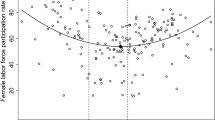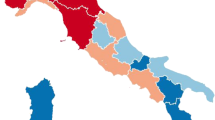Abstract
The paper argues that the processes of informalization of jobs observed during the past decades have affected both high and low income countries. Starting at the micro level of the firm, the emphasis is on how economic restructuring and globalization have generated the growth of informal activities—resulting in the vicious circle of poverty and economic insecurity for an important proportion of the population. The second part of the paper analyzes the growth of women's participation in informal activities, emphasizing that there are contradictory forces at work regarding women's employment. Despite a stubborn persistence of gender discrimination and obstacles to women's advancement, progress has taken place on several fronts, such as in the education field and in the absorption of female labor in many production processes. The paper concludes by pointing out that poverty eradication programs must emphasize the need to generate decent jobs without which these programs will continue to be ineffective. In addition, re-distributive mechanisms and different forms of social protection are needed to counteract the forces and policies generating economic insecurity.
Similar content being viewed by others
REFERENCES
Anker, R., 1998. Gender and jobs: Sex segregation of occupations in the world, Geneva: ILO.
Applebaum, I. and R. Batt, 1994. The New American Workplace: Transforming Work Systems in the United States, Ithaca, NY: Cornell University Press.
Balakrishnan, R. and M. Huang, 2000. “Flexible Workers-Hidden Employers: Gender and Subcontracting in the Global Economy, Report on a Research Project of the Women's Economic and Legal Rights Program, Washington, DC: The Asia Foundation.
Batt, R., 1996. “From Bureucracy to Enterprise? The Changing Jobs and careers of Managers in Telecommunications Services,” in P. Osterman, ed. Broken Ladders: Managerial Careers in Transition, New York: Oxford University Press.
Benería, L. and M. Roldán, 1987 The Cross Roads of Class and Gender: Industrial Homework, Subcontracting and Household Dynamics in Mexico City, Chicago University Press.
Benería, L. and F. Rosenberg, 1999. “Brazil Gender Review,” report/evaluation of World Bank projects in Brazil.
Benería, L. and L. Santiago, 2001. “The Impact of Industrial Relocation on displaced Workers: A Case Study of Cortland, NY,” Economic Development Quarterly, February.
Bluestone, B. and B. Harrison, The Deindustrialization of America, New York: Basic Books, 1982.
Bronfenbrenner, K., 2000. “Uneasy Terrain: The Impact of Capital Mobility on Workers, Wages, and Union Organizing,” Submitted to the US Trade Deficit Review Commission, September.
Bromley, R. and C. Gerry, eds. 1979. Casual Work and Poverty, London: John Wiley and Sons.
Capelli, P., 1999. The New Deal at Work, Boston: Harvard Business School Press.
Carr, M., M. Chen and J. Tate, 2000. “Globalization and Home-Based Workers,” Feminist Economics, Vol. 6, No. 3: 123-142.
Charmes, J., 2000. “Size, Trends and Productivity of Women's Work in the Informal Sector,” paper presented at the Annual IAFFE Conference, Istanbul, 15-17 August.
Dicken, P., Global Shift: Transforming the World Economy, New York: The Guildford Press.
Floro, M., 1995. “Economic Restructuring, gender, and the allocation of time,” World Development, Vol. 23, No. 11 (Nov.): 1913-1929.
Froebel, F., J. Heinrichs, and O. Kreye, 1980 The New International Division of Labor, Cambridge University Press.
Fussell. M.E, 2000. “Making Labor Flexible: The Recomposition of Tijuana's Maquiladora Female Labor Force,” Feminist Economics, Vol. 6(3): 59-80.
Garcia-Linera, A. 1999. Reproletarizaci ´on: Nueva clase obrera y desarrollo del capital insdustrial en Bolivia (1952-1998), La Paz: Muela del Diablo Editores.
González de la Rocha, M. 2000. “Private Adjustments: Household Responses to the Erosion of Work,” UNDP/SEPED Conference Paper Series.
Guttman, M., 1996. The Meanings of Macho. Being a Man in Mexico City, University of California Press.
Harrison, B., 1994. Lean and Mean. The Changing Landscape of Corporate Power in the Age of Flexibility, Basic Books.
Harrison, B. and B. Bluestone, 1988. The great u-turn: corporate restructuring and the polarization of America, New York: Basic books.
Hsiung, P-C, 1996. Living Rooms as Factories. Class, Gender, and the Satellite Factory System in Taiwan, Philadelphia: Temple University Press.
ILO (International Labor Organization) 1972. Employment, Incomes and Equality: Strategy for Increasing Productive Employment in Kenya, Geneva.
ILO (International Labor Organization) 1997. The ILO, standard setting and globalization, report of the Director General, 85th Session, Geneva.
ILO, 1999. Panorama Laboral 99. Lima: OIT.
Katz, H. C., 2000. Converging Divergencies. Worldwide Changes in Employment Systems, Ithaca, NY: Cornell University Press.
Kruse, T., 2000. “Acaso eres trabajador? Notes on industrial restructuring, labor processes and social subjects,” presented at the Workshop on Latin American Labor and Globalization, Social Science Research Council, San José, Costa Rica, July 11-12, 2000.
Lavinas, L., 1996. “As Mulheres No Universo Da Pobreza: O Caso Brasileiro,” Estudos Feministas, Vol. 4, No. 2: 464-479.
Leigh, D., 1995. Assisting Workers Displaced by Structural Change, Kalamzoo, Michigan: W. E. Upjohn Institute for Employment Research.
Lim, L., 1983. “Capitalism, Imperialism, and Patriarchy: The Dilemma of Third World Women Workers in Multinational Factories,” In J. Nash and M. Fernandez-Kelly, eds., Women, Men, and the International Division of Labor, Albany, NY: State University of New York Press.
McCrate, E., 1995. “The growing divide among American women,” unpublished paper, University of Vermont, Department of Economics.
McMichael, Philip, 1999. “The global crises of wage labor,” Studies in Political Economy 58: 11-40.
Oliveira, O. de, 2000. “Households and Families in a Context of Crisis, Adjustment and Economic Restructuring,” Center for Sociological Studies, Colegio de Mexico.
Osterman, P., ed., 1996. Broken Ladders: Managerial Careers in Transition, New York: Oxford University Press.
Ozler, S., 2001. “Export Led Industrialization and Gender Differences in Job Creation and Destruction. Micro Evidence from theTurkish Manufacturing Sector.” Unpublished paper: UCLA: Department of Economics.
Pérez-Sáinz, J.P., 2000. “Labor Market Transformations in Latin America During the 90s: Some Analytical Remarks,” FLACSO-Costa Rica.
Piore, M. and C. Sabel, 1984. The Second Industrial Divide, New York: Basic Books.
Portes, Alejandro and Manuel Castells, eds., 1989. The Informal Economy, The Johns Hopkins University Press.
Prugl, E., 1999. The Global Construction of Gender: Home-Based Work in the Political Economy of the 20th Century, New York: Columbia University Press.
Recio, A., 2000. “Empresa, distribución de la renta y relaciones laborales,” paper presented at the VII Jornada de Economia Critica, Albacete, Spain, 3-5 February.
Rodik, D., 1997. Has Globalization Gone Too Far? Washington, D.C.: Institute for International Economics.
Schellhardt, T., 1997. “Talent Pool is Shallow as Corporations Seek Executives for Top Jobs,: Wall Street Journal, 26 June.
Seguino, S., 2000“Accounting for Asian Economic Growth: Adding Gender to the Equation,” Feminist Economics, Vol. 6(3): 27-58.
Soto, H. de, 2000. El Misterio del Capital, Lima: Gabriel Valle.
SSP/UCECA (Secretaria de Programación y Presupuesto/ Unidad Coordinadora del Empleo, Capacitación y Adiestramiento), 1976. La Ocupación Informal en Areas Urbanas, Mexico D.F., December.
Standing, G. 1999. Global Labor Flexibility,: Seeking Distributive Justice, New York: St. Martin's Press.
Tiffany, J., in progress. “Lives and Livelihoods in Cortland, NY,” Ph.D. dissertation Cornell University.
Tilly, C., I. Wallerstein, A. Zolberg, E.H. Hobsbaum, and L. Benería, 1995. “Scholarly Controversy: Global Flows of Labor and Capital,” International Labor and Working Class History, No.47 (Spring): 1-55.
Tripp, Aili Mari, 1987. “The Impact of Crisis and Economic Reform on Women in Tanzania,” in L. Benería and S. Feldman, eds., Unequal Burden. Economic Crises, Persistent Poverty, and Women's Work, Westview Press: 159-180.
UNDP (United Nations Development Program) 1999. Human Development Report 1999, New York: Oxford University Press.
Wood, A. 1994. North-South Trade, Employment and Inequality: Changing Fortunes in a Skill-Drive World, Clarendon Press.
World Bank, 1955. World Development Report, New York: Oxford University Press.
World Bank, 1996 World Development Report 1996: From Plan to Market, Oxford University Press.
Ybarra, J-A., 2000. “La informalozación como estrategia productiva. Un análisis del calzado valenciano,” Revista de Estudios Regionales, No. 57: 199-217.
Author information
Authors and Affiliations
Rights and permissions
About this article
Cite this article
Benería, L. Shifting the Risk: New Employment Patterns, Informalization, and Women's Work. International Journal of Politics, Culture, and Society 15, 27–53 (2001). https://doi.org/10.1023/A:1011115816320
Issue Date:
DOI: https://doi.org/10.1023/A:1011115816320




